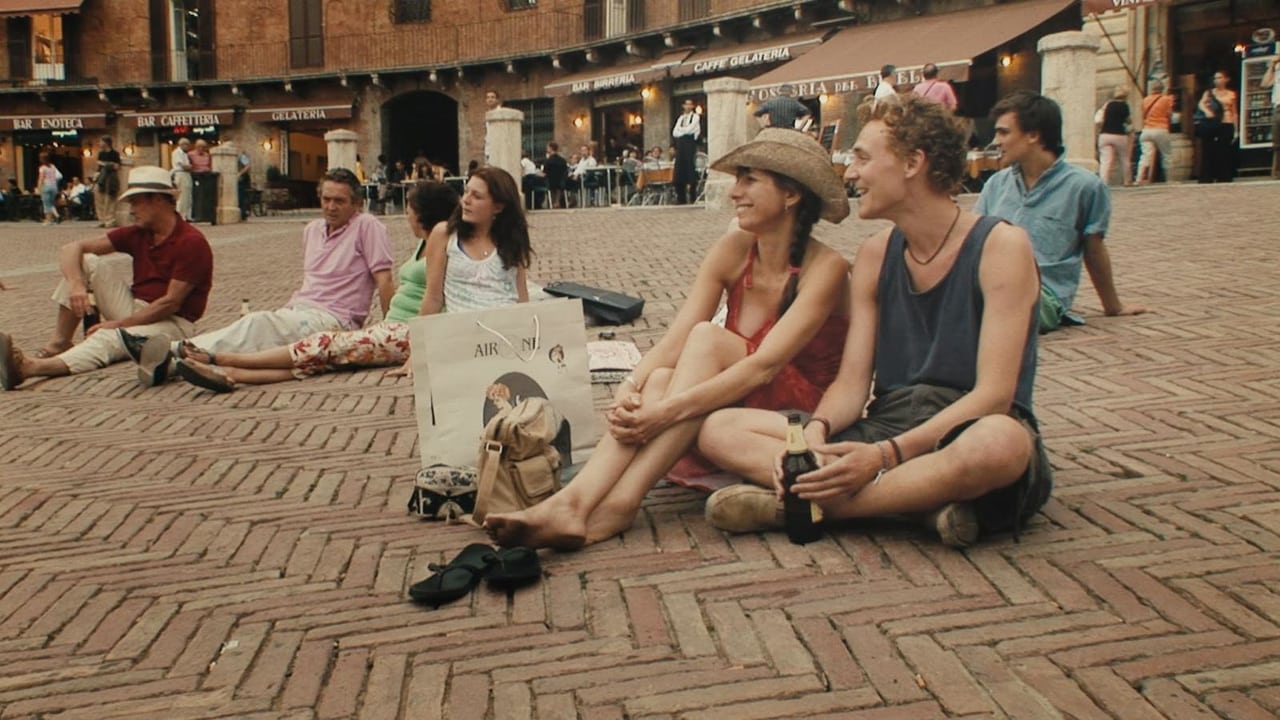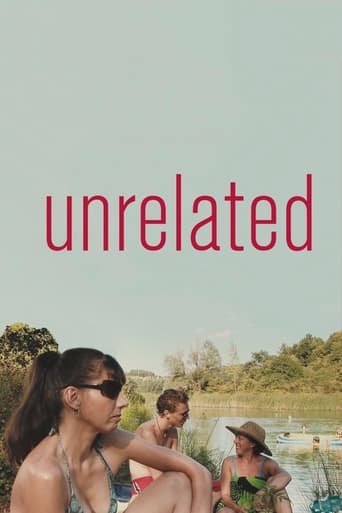

That was an excellent one.
... View MoreTerrible acting, screenplay and direction.
... View Moren my opinion it was a great movie with some interesting elements, even though having some plot holes and the ending probably was just too messy and crammed together, but still fun to watch and not your casual movie that is similar to all other ones.
... View MoreOne of the best movies of the year! Incredible from the beginning to the end.
... View MoreI'll start right off by saying this movie won't be for everyone. It's a very slow movie, the kind where you're watching people NOT say things for hours and where there's minimal plot. But it's also the type of movie where if you connect with the characters you REALLY connect with them and for me it was a pleasure to spend time with these characters. The main character of Hogg's Unrelated is Anna a woman who is in the early stages of middle age. Anna and her husband have been invited by her oldest friend Verena to join Verena's family and extended family (made up of three adults and four teenagers) in a villa in the Italian countryside where they spend their summers. Only Anna shows up without her partner and soon enough, rather than spend time with the "olds" Anna is adopted into the friend group of the "youngs", the teens that are young enough to be her children. Drinking and getting high irresponsibly she forms a light flirtation with Oakley, the ring leader of the pack who, despite his youth, has an air of authority and control which stands out in contrast to the somewhat shy and nervous Anna. For those willing to give Unrelated a chance I will say that is one of the finest meditations on adulthood, particularly adult womanhood, I've ever seen. If the first half of the film is Anna drifting about with the youngs, innocently capturing a youth she never quite had, the second half is her painful growing up.
... View MoreThis movie has a group of unconnected people (despite being "family" and "friends") who never do or say anything, on vacation in a villa in Italy, in one scene after another of them situated in places (e.g. eating pizza, at a pub, walking, swimming, drinking, smoking, towing a car). They are self-absorbed without having any redeeming qualities even among "oldest friends;" they are to a person nasty, yet boring. Literally no one ever says anything. One time the father screamed at the kids. That's about it. Probably the most interesting thing about it was that once the actress playing "Anna" called Tom Hiddleston "Tom" instead of his character's actual name, "Oakley," in a scene. Utterly pointless.If you want to see a movie with Tom Hiddleston that actually has characters in it, see "The Deep Blue Sea." They're jerks too, but it, by contrast, has character, dialogue and plot.
... View MoreSomeone once said, "It's the singer, not the song". Here, it's difficult to know which is responsible for the effect created by this film -- the cast, or the writing (and by extension, directing). Certainly, Ms. Hogg deserves credit for her sure, understated camera-work and pithy screenplay. The film demonstrates, in equal measure, both a sense of forward movement (in terms of plot and tension), and a verisimilitude of action and speech. There is a quasi-documentary feel to the proceedings; we enter and view scenes from odd angles, with the camera in a corner, or down a hall from the intended dialogue; scenes begin and end in medias res. The effect is never, however, mannered or jarring, but is calculated for maximum dispatch in terms of character and plot development.However, the performances themselves are so fine, so delicately thatched and inked as to leave the impression of real people, and not "roles" played by professionals. Chief among them is Ms. Worth's turn as Anna, who is not quite as hapless, or feckless, as some of the other reviewers on this site would have indicated. It is interesting to see those viewers' reactions to her pass at the younger Oakley which characterize it as disgusting, or out-of-touch. In another movie (say an Irvine Welsh adaptation, for instance) a woman like Anna would get at least two fairly raunchy sex scenes. This is not to short-change Ms. Worth's physical attractiveness; in fact, the heat between her character and that of Mr. Hiddleston's is palpable. But Ms. Hogg is not after the same sort of effect as Irvine Welsh; this film is a slow-burner. And Ms. Worth finds her footing surely in the lazy Tuscan atmosphere, conveying thousands of words with just a look. Take, for instance, her semi-squint in reaction to Oakley's prying questions about children. The answer is writ large between the drawn-up lower lids, the slight pucker to the mouth. Further to Ms. Worth's credit is that her background is theatre and opera (she has done some choral roles with major productions) neither of which genre is famous for the slight gesture, or subtlety of reading. Here, though, she is "playing chamber music", and not blasting grand opera to the back of the house. All told, this is probably one of the best films to come across this reviewer's screen in the last twenty years.
... View MoreThe one thing this film was, was a brilliant portrayal of the obnoxious moneyed English at play in Tuscany, the arrogance and superciliousness of the younger characters and the emotionally uptight 'olds'. I'm not sure if this was the intention of all concerned as the programme notes at the cinema summarised the film as 'an illuminating and touching study of personal crises over ageing and our need to belong'. The Oakley character was particularly repulsive, superb acting there. As for Anna, her desperation oozed out of every hangdog look she delivered, perpetually on the verge of tears which she duly wept with absolutely no sympathy from myself. I'm guessing the dialogue was improvised, if not then the irritating 'banter' and outpourings reveal a script of true mastery, very naturally mundane with the 'youngs' speaking American TV influenced posh and the 'olds' confined to world weary tones. Overall, I couldn't have cared less if Anna had been gang raped or if they'd all been killed in the car crash, the world would be better off without people like these. By the time of Anna's revelation to V at the hotel I was so sick of her face that it was the one moment I laughed. It was bad judgement on my part going to see Unrelated and half way through I was close to walking out but like any disaster, it was difficult to avert my eyes, a woeful experience. I hope all concerned go on to better things.
... View More